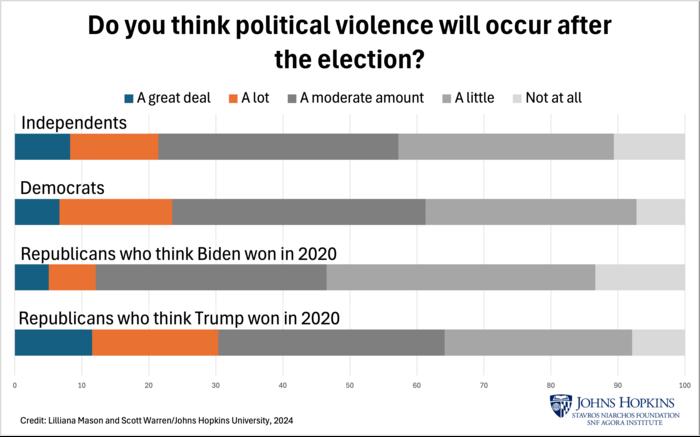Republicans who believe Donald Trump won the 2020 election are anticipating a much more chaotic election cycle this year than other GOP, Democratic, and independent voters, according to new polling data from the SNF Agora Institute at Johns Hopkins University.

Credit: Lilliana Mason and Scott Warren/Johns Hopkins, 2024
Republicans who believe Donald Trump won the 2020 election are anticipating a much more chaotic election cycle this year than other GOP, Democratic, and independent voters, according to new polling data from the SNF Agora Institute at Johns Hopkins University.
Among Republican respondents who believe President Joe Biden did not lawfully win the 2020 election, about 31% think that either “a lot” or “a great deal” of political violence will occur after the 2024 election—compared to 24% of Democratic voters, 21% of independents and just 12% of GOP voters who acknowledge Biden’s victory four years ago, the poll found.
In addition, 65% of Republicans known popularly as “election deniers” also believe that the United States is “very likely” or “somewhat likely” to lapse into a civil war—higher than the 40% of other Republicans, 43% of Democrats, and 46% of independents who expressed similar sentiments.
The poll questioned 2,000 Americans eligible to vote and was conducted July 26-30 by Lilliana Mason and Scott Warren from SNF Agora Institute and YouGov, a polling and data company based in the United Kingdom. The poll is the first of four that will take place during this election season and was commissioned as part of an effort to better understand the U.S. electorate and the growing divide between Republicans who do not accept the 2020 election results and those who do.
“Fortunately, most Americans don’t think the same way as the 2020 election deniers. But that doesn’t mean we’re in the clear. Expecting chaos can fuel more chaos,” said Mason, a political science professor who studies political violence and polarization and who is co-lead on the project with Warren. “If we’re not diligent, that chaos can unravel the foundational threads of our democracy.”
Researchers worked with YouGov to poll a demographically and politically representative sample of the U.S. electorate. Respondents were asked about their party affiliations, the 2020 election results, where they get their information from, and what they think about people from other parties.
Most respondents—nearly 70%—think it’s important to accept election results even if their candidate loses.
“For a free and fair democratic election to work, people need to believe in the electoral system and accept the outcome,” said Warren, an SNF Agora fellow. “Our elected leaders should heed the fact that the vast majority of Americans believe that our elections work, and that losing candidates should concede. Rather than sowing doubts, leaders need to talk about how these democratic institutions work and build trust with the electorate.”
Of note, 85% of respondents are still concerned about misinformation in the election.
Republicans who believe Trump won in 2020 are more concerned about misinformation than any other group surveyed and believe “liberal media” are responsible. These respondents also stated they are most likely to turn to “their favorite television news anchor,” “friends and family,” and “chief election officers” for information about the outcomes of elections in their states.
Democrats blamed misinformation nearly equally between “Republican politicians” and “conservative media” and reported relying on chief election officers for election results sooner than GOP respondents.
“We know that what leadership does matters. Leaders in politics and media have a real influence on their supporters,” Mason said. “If they continue to push a dangerous and chaotic vision of what the election might look like, they could end up creating a self-fulfilling prophecy. If they prefer to have a nonviolent election, there are some simple and easy things they can do.”
Mason said that leadership can refrain from inflammatory rhetoric, clearly state that violence from supporters is unacceptable, and disavow violence when it occurs.
Researchers will survey the same pool of respondents again in September, mid-October, and after the election in November to chart how their opinions and feelings shift over the presidential election cycle.
Other key findings:
- If the election were held today, 43% of respondents would vote for Kamala Harris and 42% would vote for Donald Trump.
- Most Americans don’t trust the losing party to accept the election results. Only 16% of Democrats think Republicans will accept election results if their candidate loses in November, and only 15% of Republican election deniers think Democrats will accept the results if their candidate loses (50% of the other Republicans think Democrats will accept the results of a losing result).
- Majorities of all voters agreed that violence is not justified to prevent an opposing party from controlling the country.
Click here for access to poll figures.
Method of Research
Survey
Subject of Research
People



